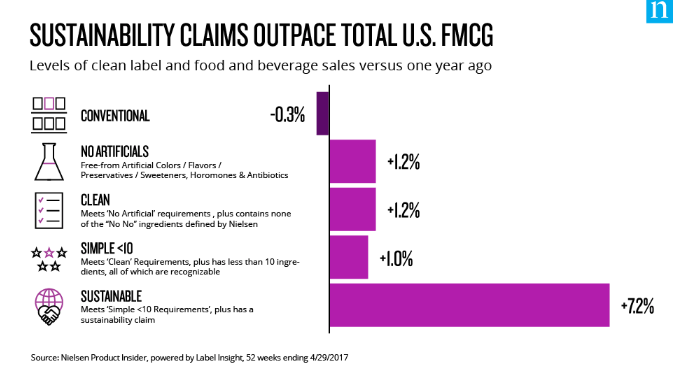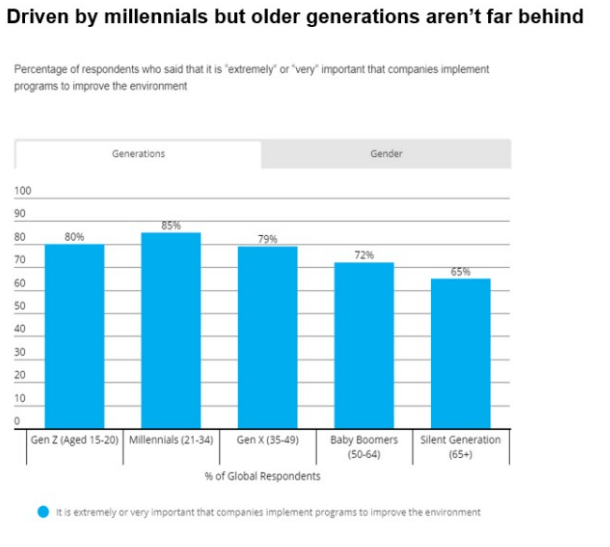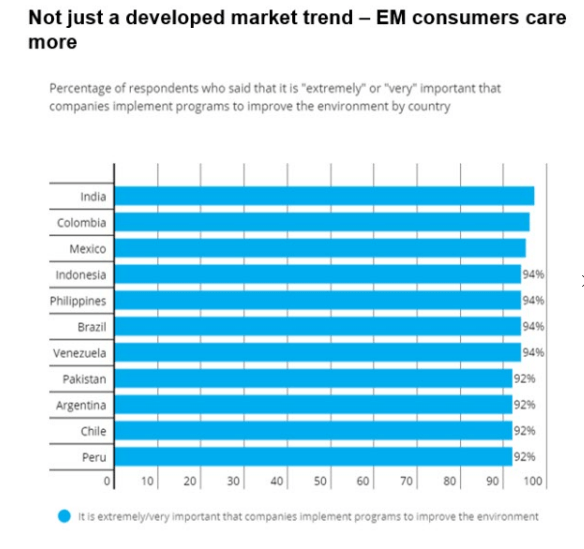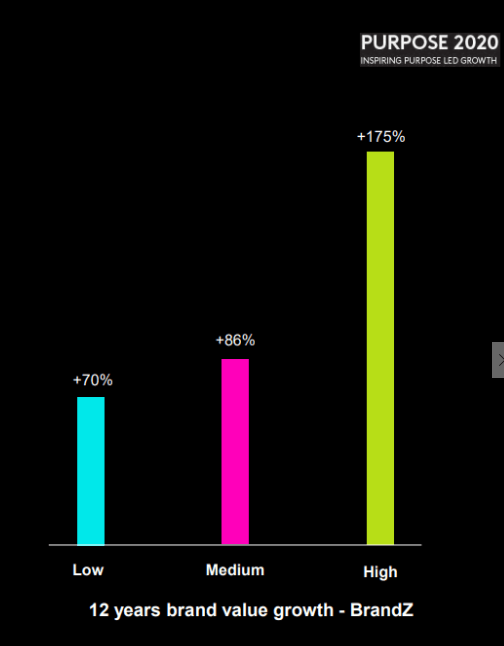Just a few decades ago, if you expressed some modicum of environmental awareness or concern for the planet, you’d be called a hippy or a tree-hugger. Today, things are changing.
As environmental and social concerns creep into the wider public consciousness and the stereotypes fade from memory, consumers are increasingly being drawn towards brands that are acting responsibly.
In response, companies are integrating more and more purposeful messages into their marketing, as well as offering products with a reduced impact on human health or the environment. According to Nielsen, sustainable products are set to account for a quarter of retail sales by 2025, and in 2017 we saw sales of food and beverages with sustainability claims outpace the growth of their conventional counterparts significantly, as the chart below demonstrates.

Source: Nielsen Product Insider, powered by Label Insight, 52 weeks ending 29/4/2017
This is all linked to the rise of authenticity, which is fast emerging as one of the most desired brand attributes among consumers. Authenticity is all about being unique and genuine, and one of the key ways in which companies are seeking to demonstrate authenticity is through establishing some kind of environmental or social purpose beyond just making a profit. For example, in 2011, just 20% of companies in the S&P 500 publicly disclosed environmental, social and governance (ESG) information, and today that figure is at 85%.[1]
In fact, we think this is going to continue to be such an important trend in the consumer goods sector that we’ve made authenticity one of the sub-themes of our overarching consumer power investment theme.
There are two key sustainability myths still to bust though. This powerful trend is not unique to wealthy developed markets or solely millennials. In fact, the research shows that while millennials care the most, they’re only slightly ahead of their older peers. Furthermore, emerging markets have been found to be the regions where consumers care the most about environmental issues, most probably because they are living with some of the worse effects of pollution and climate change, and this is only set to worsen.

Source: https://www.nielsen.com/us/en/insights/reports/2018/the-education-of-the-sustainable-mindset.html

Source: https://www.nielsen.com/us/en/insights/reports/2018/the-education-of-the-sustainable-mindset.html
However, consumers within these regions have different requirements. In markets like India, it’s about traditional ingredients which have long been associated with health. As such, local companies with their on-the-ground knowledge tend to dominate the market. In China, where the increasingly affluent consumer wants to use this wealth to buy themselves the best they can afford, sustainability is ‘premium-ised’ and associated with better functionality and higher quality ingredients. In markets like the US and the UK, consumers tend to be more educated about sustainability, and therefore companies face the challenges of standing out in a crowded market, while understanding what specific type of sustainability the consumer is seeking.

The challenges do not stop there. Authenticity branding isn’t necessarily always a winner. Sometimes, if not carefully thought through or correctly executed, messages can seem jarring, patronising, or just plain offensive to certain groups. Added to this, social media has given brands closer connections with their consumers, and while this can help them to disseminate ‘authentic’ content that resonates with shoppers, it also works both ways, and consumers are quick to be critical when they don’t like a message.
Take Dove’s shower gel bottles in the shape of different female body types, or Pepsi’s now infamous advert featuring Kendal Jenner, which showed her diffusing tension between the police and protestors simply by handing an officer a can of Pepsi. Both of these initiatives were well intentioned (if poorly thought through and insufficiently consumer tested!), but social media backlash forced the ads (and, in Dove’s case, the bottles) to be withdrawn.
It’s hard to assess what impact this has on a brand (other than giving social media managers a headache), as unsurprisingly companies aren’t keen to shout about campaigns which have gone wrong. However, it’s obviously damaging to brand perception as well as a big waste of a marketing budget.
When executed well, though, such initiatives can have a very positive impact on brand value. A survey by consultancy BrandZ found that brands perceived as having a high level of positive impact have grown their value 2.5 times more than brands with a low perceived impact.
12-year value growth for brands with low, medium and high perceived impact

Source: BrandZ, 2019
This theory works in practice too. According to AB InBev, its ‘Buy a Lady a Drink’ campaign, which donated one year of clean water to a woman living in an area of poor water access for each pack of Stella Artois bought, increased brand awareness by 5.2% and increased purchase intent by 2.7%, showing the clear uplift in sales this activity can bring.
These sustainability messages are only getting more impactful, with companies starting to enter political discourse in order to stand out in the competition for consumer engagement.
Last year, Nike showed how pushing the boundaries in branding can pay off. Unusually for a large global brand which prefers to stay neutral, Nike ventured into a very topical political debate by featuring Colin Kaepernick, the NFL quarterback whose national anthem protest against police brutality arguably cost him his football career, in an advert to celebrate the 30th anniversary of its ‘Just Do It’ campaign.
While some demographic groups hated the ad, including President Trump, its core base of 18-29 year old males were enamoured by it, with Nike’s online sales up 31% during the bank holiday weekend after the ad launched. Nike’s CEO has since said the campaign led to “record” engagement and has been driving product sales.
So while it was certainly a strategic risk to alienate some consumers while engaging others, it was a risk that paid off.
To sum up, sustainability, purpose and authenticity are all taking hold in the consumer sector, and companies are increasingly pushing the boundaries and stepping into political debates in order to stand out in a crowded space. At the same time, it’s important to make sure that these messages are well judged and coherent with the overall company because, when it comes to authenticity, consumers know a fake when they see it.
[1] Governance & Accountability Institute 2018
This is a financial promotion. Any reference to a specific security, country or sector should not be construed as a recommendation to buy or sell investments in those countries or sectors. Please note that holdings and positioning are subject to change without notice.






Comments